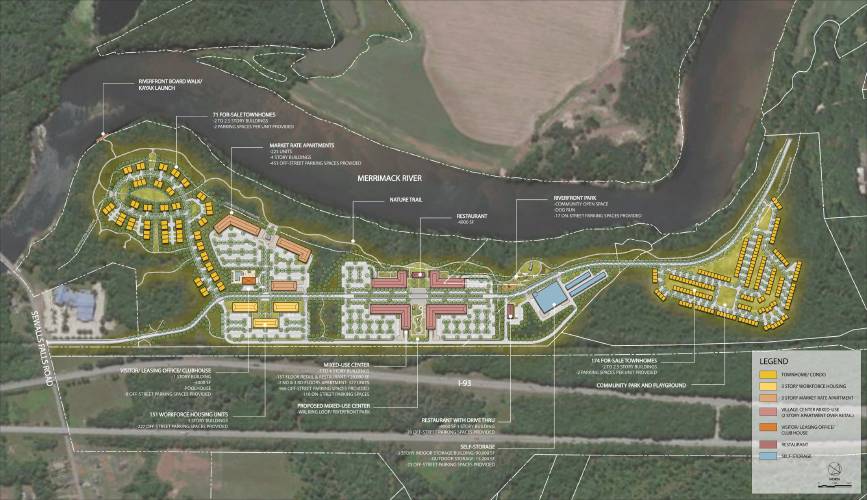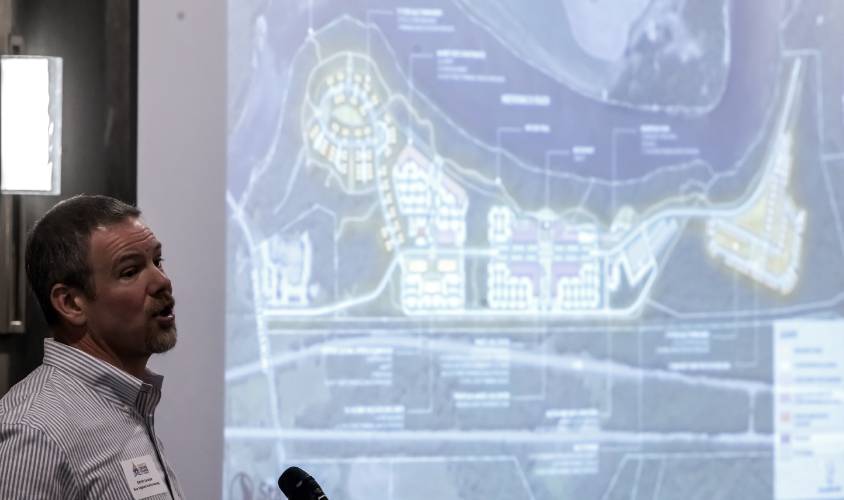‘It’s just not that attractive to us’: City stalls massive housing project in Concord
|
Published: 08-21-2024 5:12 PM
Modified: 08-21-2024 5:37 PM |
The largest planned housing project in Concord has been scuttled by city leaders to the point that even a scaled-down version of the project may not be possible for years.
Developers behind the Monitor Way project have claimed city staff have not negotiated in good faith, “overstated” potential traffic impacts, “grossly over estimated” the cost of the infrastructure needs of their project, and reversed their stance on the city’s openness to a needed zoning change for the site. They also accused City Manager Tom Aspell of refusing to meet with them directly and boxing them out of a meeting with the City Council.
“I think we all know, deep down, that this project has the potential to become a lasting legacy – for the City of Concord, for us as a development team, for the Mayor and Council and for city staff,” Kevin Lacasse, CEO of New England Family Housing, the company behind the Monitor Way project, said in a letter to city on Tuesday. “We respectfully request a meeting with you and with any other city official willing to join us.”
Lacasse and his development team have an agreement to buy the land from the parent company that owns the Concord Monitor and five other newspapers in New Hampshire and Massachusetts. The agreement does not include the Monitor's building and the newspaper has no role in the sale.
City leaders say the project — despite the abundance of housing it offers — is simply out of line with their vision. They also say they want to delay zoning changes until after the City Council updates the Master Plan, a process that won’t conclude for about four years.
Matt Walsh, deputy city manager for development, told Lacasse in a June letter that the project was "inconsistent" with both the city's zoning ordinance and its master plan.
“The City will not entertain any further requests from NEFH or its partners to rezone the property, or to enter into a public-private partnership for infrastructure improvements for the Monitor Way Project until the above referenced Master Plan and comprehensive rezoning processes have been completed." Walsh wrote.
Mayor Byron Champlin said that the city was following its normal negotiation process and that it won’t consider a partnership on the project because it broadly doesn't support it.
Article continues after...
Yesterday's Most Read Articles
“The way his project is right now,” Champlin said, “it’s just not that attractive to us.”
In contrast, the city has agreed to explore a partnership for the second-largest proposed housing development at the Steeplegate Mall site and has approved zoning changes for other mixed-use housing projects.
Lacasse implored the city to reconsider.
“For more than two years, we have been talking productively with residents, community groups, city staff, city council members and others about our plan, and have received positive feedback at every step. At no time was updating the master plan discussed as a prerequisite for rezoning the site,” Lacasse said in a statement Wednesday. “Monitor Way would not only create hundreds of new homes available at all income levels, but also preserve land along the Merrimack River while improving controlled access for all to this precious resource. We believe this is a much more appropriate use than industrial development along the river.”
As a result of the pushback, Lacasse’s team proposed a smaller version of the project. Instead of nearly 1,000 housing units, more than 700 of them apartments and 150 of them designated workforce housing, they would build 172 condos — cutting, for now, more than 80% of the units, plus all apartments and workforce housing.
The scaled-back plan still requires a rezone of the land that, because of the master plan update, won’t happen until at least 2028, according to a letter Walsh sent to the developer in June.
Notably, the city rezoned land for the neighboring retail development off Exit 17, or Merchant’s Way. In 2018, it also rezoned land on Manchester Street to make way for a mixed-use housing project. Last week, City Council agreed to change the city’s zoning ordinance to clear a path for a downtown project. The former was built on unused land, the latter two are redevelopment.
In a letter to Walsh on Tuesday, Lacasse outlined concerns with how the city has engaged with his team.
“We are proposing what is likely the largest single development in Concord’s history,” Lacasse wrote. “As such, we believe we should be afforded an opportunity to engage in a meaningful and productive discussion with city staff on a path forward, as opposed to being sidelined for what could be several years of debate on updating the master plan.”
Aspell’s office did not respond to an interview request for this story.
Concord’s 2030 Master Plan sees this area of the City being developed industrially or as an office park, not as housing — and Champlin argued a potential future industrial use of the property was key to expanding the city’s tax base. The plan also prioritizes the repurposing of existing development over construction on raw land.
“The City will not entertain any additional requests to rezone the Monitor Way site, or for a public-private partnership, until the forthcoming Master Plan update is completed,” an email summarizing the dispute from Walsh to city councilors said.
Initially, the project received positive feedback from Aspell’s office and the planning board about its direction, Lacasse’s letter states. Since, he said, the tenor has changed.
Lacasse expressed confusion about why the city is raising alarms about the project’s first hurdle — rezoning of the land by City Council — when it had appeared open to that in the past.
“In May 2022, you said in an email that City Staff felt our conceptual plans ‘were generally consistent with the community’s goals and aspirations for the site.’ This email exchange led us to believe that we were on the right track early on,” Lacasse wrote.
Beyond the zoning roadblock, the city and the Monitor Way developer also disagree about the cost of all infrastructure improvements needed to make the project happen. The developer calculates its total ask of the city at $6.67 million. Walsh’s calculation puts it at $18.25 million, plus an additional $15 million to $20 million in offsite traffic improvements, putting the city’s total at more than $38 million.
"I think Mr. Lacasse has been a little bit disingenuous about some of the costs of his project,” Champlin said.
Monitor Way would put a total of $50.5 million in taxes to city coffers by 2035, an estimate from the developer says. Once the project is complete, they estimated the annual property tax bill would be between $6 million and $8 million. The same land brought in less than $6,000 in city taxes in 2023, according to city records.
Monitor Way isn’t the only proposed housing project to face major delays from the city.
The team behind the Manchester Street project, after two years of delays, expressed frustration with the process last year.
“The sayings are all true: Time kills all deals. Delays cost money, patience has its limits, they all mean the same thing,” Ari Pollack a lawyer for that project — and many others — said to the planning board in November. The Manchester Street project did eventually get the approvals it needed, and Robert Duval, its chief designer, said Wednesday that recently, working with the city had gotten better and construction was expected to start soon.
Estimates from New Hampshire Housing indicate that the state needs to build 60,000 units by 2030 and 90,000 units by 2040 to meet demand.
Editor’s note: Staff writer Michaela Towfighi contributed to this report.










 Mullet madness: Young man who died in motorcycle accident remembered at local fundraiser
Mullet madness: Young man who died in motorcycle accident remembered at local fundraiser ‘Entire paradigm has to shift’: Majority of parents express support for phone ban, but predict rocky rollout
‘Entire paradigm has to shift’: Majority of parents express support for phone ban, but predict rocky rollout New Hampshire committee seeks to prevent domestic fatalities like murder-suicide in Berlin
New Hampshire committee seeks to prevent domestic fatalities like murder-suicide in Berlin ‘A little piece of everything I like’: New Pittsfield barbershop brings more than a haircut to downtown
‘A little piece of everything I like’: New Pittsfield barbershop brings more than a haircut to downtown
